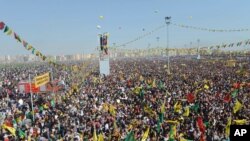ISTANBUL —
The imprisoned leader of the Kurdish rebel group the PKK has announced a cease-fire and withdrawal of its forces from Turkey. The announcement is part of ongoing efforts to end the nearly three decades conflict between the PKK and the Turkish state.
Ocalan's call for a cease-fire was made in a declaration read out to a massive crowd celebrating Newroz, the start of the Kurdish New Year, in Diyarbakir, the main city in predominantly Kurdish southeast Turkey.
"This is the time of politics, not guns," he said, adding that all guns should be silenced and the Kurdish armed units should be withdrawn outside Turkey.
The cease-fire was widely expected, but the call for the withdrawal of Kurdish rebel forces is being viewed as equally significant. Experts say as many as 3,000 Kurdish rebels are based in Turkey. Turkish Prime Minister Recep Tayyip Erdogan has made their withdrawal a condition for the start of formal talks to end the decades-long conflict.
Erdogan launched his peace efforts last October. Logistically, questions remain how the fighters will withdraw. PKK leaders based in neighboring northern Iraq have called for guarantees that the withdrawing rebels will not be attacked.
A similar withdrawal in 1999 following the capture of Ocalan by Turkish forces resulted in Turkey's army inflicting heavy casualties on the group. A senior minister, speaking ahead of the declaration, said a full PKK withdrawal could be achieved as early as the end of the year.
It remains unclear what concessions the Turkish government is prepared to give. But Kurdish political leaders expect reforms to be part of current parliamentary efforts to write a new constitution.
The PKK, along with legal Kurdish groups, are calling for greater cultural rights, local autonomy and amnesty for imprisoned Kurdish rebels and activists, including Ocalan. Senior Kurdish politicians have warned that the road to peace is still difficult, and fraught with the danger of provocations.
Observers note that the issue of trust is still an obstacle. But both sides appear to agree these latest efforts offer the best opportunity for peace since the conflict, which has claimed over 40,000 lives, started nearly three decades ago. The PKK is designated as a terrorist organization by both the United States and European Union.
Ocalan's call for a cease-fire was made in a declaration read out to a massive crowd celebrating Newroz, the start of the Kurdish New Year, in Diyarbakir, the main city in predominantly Kurdish southeast Turkey.
"This is the time of politics, not guns," he said, adding that all guns should be silenced and the Kurdish armed units should be withdrawn outside Turkey.
The cease-fire was widely expected, but the call for the withdrawal of Kurdish rebel forces is being viewed as equally significant. Experts say as many as 3,000 Kurdish rebels are based in Turkey. Turkish Prime Minister Recep Tayyip Erdogan has made their withdrawal a condition for the start of formal talks to end the decades-long conflict.
Abdullah Ocalan and the PKK
Abdullah Ocalan and the PKK- 1978: Ocalan founds the Kurdistan Workers' Party, or PKK.
- 1984: Kurdish rebels begin an armed struggle in southeastern Turkey
- 1999: Ocalan is captured in Kenya, brought to Turkey and sentenced to death.
- 2002: Ocalan's sentence commuted to life in prison
- 2012: PKK fighting intensifies, imprisoned Kurds go on hunger strike for two months
- 2013: Ocalan meets with Turkish officials in prison, calls for cease-fire.
A similar withdrawal in 1999 following the capture of Ocalan by Turkish forces resulted in Turkey's army inflicting heavy casualties on the group. A senior minister, speaking ahead of the declaration, said a full PKK withdrawal could be achieved as early as the end of the year.
It remains unclear what concessions the Turkish government is prepared to give. But Kurdish political leaders expect reforms to be part of current parliamentary efforts to write a new constitution.
PKK [Kurdistan Workers Party]
The Kurdistan Workers Party ( PKK):- founded in 1974 by Abdullah Ocalan
- Marxist-Leninist separatist organization
- took up arms against Turkey in 1984; more than 40,000 people have been killed since
- most of the violence has been in Turkey's southeast
- listed as a terrorist group by Turkey, the US and EU
- has declared several short lived cease-fires
Observers note that the issue of trust is still an obstacle. But both sides appear to agree these latest efforts offer the best opportunity for peace since the conflict, which has claimed over 40,000 lives, started nearly three decades ago. The PKK is designated as a terrorist organization by both the United States and European Union.










